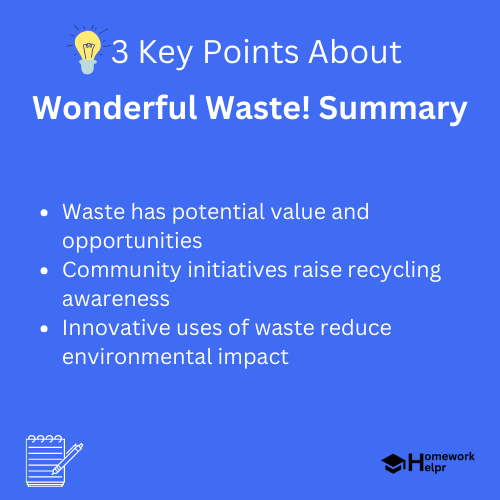📝 Summary
Waste is often viewed as undesirable and burdensome, yet the concept of Wonderful Waste encourages a shift in perspective, revealing waste’s potential value. It promotes sustainability and resourcefulness, urging us to manage waste effectively to lessen our environmental footprint. Different types of waste, from organic to electronic, can be innovatively reused or recycled, transforming trash into treasure. Community initiatives around the globe play a crucial role in advocating for waste management and recycling practices, ultimately aiming for a cleaner, healthier environment. Embracing this mindset can cultivate a more sustainable future.
Wonderful Waste: Understanding the Value of Waste
Waste is often seen as something undesirable and burdensome, but what if we told you that waste holds immense potential? Wonderful Waste is a concept that challenges our perception, urging us to find value in what we typically discard. In this article, we’ll explore how waste can be transformed into something valuable and innovative.
The Philosophy of Waste
Across cultures, waste has been a topic of debate, typically associated with loss and decay. However, there is a growing movement to see waste as an opportunity rather than an obstacle. This philosophy emphasizes the need for sustainability and resourcefulness. By utilizing waste effectively, we can reduce our environmental footprint and contribute to a cleaner planet.
Definition
Resourcefulness: The ability to find quick and clever ways to overcome difficulties and to utilize resources effectively.
Types of Waste
Understanding the different types of waste is crucial in rethinking its value. Here are the primary categories of waste:
- Organic Waste: This includes food scraps, garden waste, and other biodegradable materials.
- Plastic Waste: Items like bottles, bags, and packaging that take centuries to decompose.
- Electronic Waste: Old electronics, batteries, and devices that pose significant environmental risks.
- Textile Waste: Discarded clothing and fabric materials that can often be recycled.
By categorizing waste, we can identify specific methods to recycle, compost, and innovate, turning trash into treasure.
Examples
For instance, food waste can be composted to create nutrient-rich fertilizer for gardens, while plastic bottles can be transformed into clothing fibers.
Innovative Uses of Waste
Let‚’ delve into some amazing innovations that highlight the concept of Wonderful Waste. Here are a few inspiring examples:
- Recycled Fashion: Many designers are now crafting clothing from recycled plastics, showcasing sustainability in the fashion industry.
- Upcycled Art: Artists are creating stunning sculptures and pieces of art from discarded materials, promoting awareness of waste.
- Waste-to-Energy Plants: These facilities convert non-recyclable waste into energy, providing a double benefit to society.

The Importance of Recycling
Recycling is a fundamental component in the Wonderful Waste movement. By recycling, we can:
- Conserve Resources: Reduce the need for raw materials.
- Save Energy: Using recycled materials often requires less energy than producing new ones.
- Reduce Pollution: Diverting waste from landfills minimizes greenhouse gas emissions.
These benefits underline the significance of adopting recycling practices in our daily lives, which can lead to a healthier environment.
Definition
Greenhouse Gases: Gases that trap heat in the atmosphere, contributing to global warming and climate change.
Community Initiatives to Combat Waste
Many communities around the world are actively engaged in initiatives to tackle waste. These grassroots movements focus on:
- Educational Campaigns: Raising awareness about waste management and recycling.
- Clean-Up Drives: Local groups often organize events to clean parks, streets, and beaches.
- Food Drives: Collecting excess foods to donate to those in need while reducing organic waste.
❓Did You Know?
Did you know that approximately 1.3 billion tons of food is wasted globally each year? That‚’ roughly one-third of all food produced!
Wonderful Waste in Different Cultures
Across the world, various cultures exhibit unique methods of managing waste and finding uses for it. For example:
- In Japan, the art of Komposting is deeply rooted in their culture; residents often have compost bins at home.
- In India, the concept of ‚ÄúJugaad” promotes innovative uses of waste products in everyday life.
- In Scandinavian countries, waste management is part of community education, teaching children the importance of recycling.
These cultural practices emphasize the value of waste management and highlight how different societies can inspire each other in tackling similar challenges.
Examples
For example, the Japanese practice of composting not only reduces waste but also teaches children about ecology and sustainability.
Challenges in Waste Management
Despite the positive trends, there are several challenges that must be addressed in waste management. The primary obstacles include:
- Lack of Awareness: Many people are unaware of proper recycling and disposal methods.
- Inadequate Infrastructure: Some communities lack the proper facilities for waste management, hindering recycling efforts.
- Contamination of Recyclables: Non-recyclable items mixed with recyclables can ruin entire batches and lead to landfill waste.
Tackling these challenges requires a coordinated effort from governments, communities, and individuals alike.
Definition
Contamination: The introduction of harmful substances or unwanted materials into a clean environment or product, leading to spoilage.
Conclusion: Embracing the Wonderful Waste Approach
As we have explored, viewing waste as a potential resource rather than a problem can transform our world. By adopting a Wonderful Waste mindset, we can reduce our ecological impact, foster creativity, and embrace sustainability. It is crucial for each one of us to take personal responsibility for the waste we generate and to advocate for innovative recycling and management initiatives in our communities.
Together, we can turn waste into valuable resources, contributing to a more sustainable future for generations to come. Let’s embark on this journey of reimagining waste‚Äîafter all, one person’s trash can indeed be another’s treasure!
Related Questions on Wonderful Waste! Summary
What is the Wonderful Waste concept?
Answer: It emphasizes finding value in discarded materials.
Why is recycling important?
Answer: It conserves resources and reduces pollution.
What types of waste are there?
Answer: Organic, plastic, electronic, and textile waste.
How can communities combat waste?
Answer: Through educational campaigns and clean-up drives.
